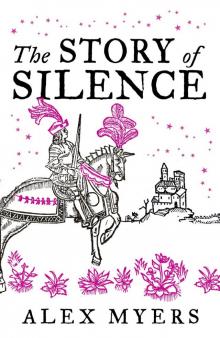- Home
- Alex Myers
The Story of Silence
The Story of Silence Read online
Copyright
HarperVoyager
An imprint of HarperCollinsPublishers Ltd
1 London Bridge Street
London SE1 9GF
www.harpercollins.co.uk
First published in Great Britain by HarperVoyager 2020
Copyright © Alex Myers 2020
Jacket design by Holly Macdonald © HarperCollinsPublishers Ltd 2020
Alex Myers asserts the moral right to be identified as the author of this work.
A catalogue copy of this book is available from the British Library.
This novel is entirely a work of fiction. The names, characters and incidents portrayed in it are the work of the author’s imagination. Any resemblance to actual persons, living or dead, events or localities is entirely coincidental.
All rights reserved under International and Pan-American Copyright Conventions. By payment of the required fees, you have been granted the non-exclusive, non-transferable right to access and read the text of this e-book on screen. No part of this text may be reproduced, transmitted, down-loaded, decompiled, reverse engineered, or stored in or introduced into any information storage and retrieval system, in any form or by any means, whether electronic or mechanical, now known or hereinafter invented, without the express written permission of HarperCollins.
Source ISBN: 9780008352684
Ebook Edition © July 2020 ISBN: 9780008352707
Version: 2020-05-25
Dedication
To all my teachers who led me to read, write, and think and who also let me find my own way.
Contents
Cover
Title Page
Copyright
Dedication
Preface
Prologue
Chapter One
Chapter Two
Chapter Three
Chapter Four
Chapter Five
Chapter Six
Chapter Seven
Chapter Eight
Chapter Nine
Chapter Ten
Chapter Eleven
Chapter Twelve
Chapter Thirteen
Chapter Fourteen
Chapter Fifteen
Chapter Sixteen
Chapter Seventeen
Chapter Eighteen
Chapter Nineteen
Chapter Twenty
Author’s Note
Acknowledgements
About the Publisher
Preface
In 1911, in Wollaton Hall in Nottingham, in a crate marked Old papers – no value, rested a manuscript. The manuscript, likely copied for Lady Beatrice de Gavre on the occasion of her marriage in 1286, contains eighteen stories. One of these was Silence – a previously undiscovered poem over seven hundred years old.
Written in Old French, a mixture of Francien and Picard, the poem is an unusual one. It tells the story of a girl raised as a boy – a motif somewhat familiar from the tales of warrior maidens and women musicians that circulated in the same time period. But it also contains completely novel elements, such as spirited debates between personified figures of Nature and Nurture, who argue over Silence’s true self.
In places, this 13th-century poem treats gender in a way that seems post-modern. The purported author, one Heldris of Cornwall (otherwise unknown), puns with the gendered endings of words and deliberately undermines the ‘reliability’ of language to reveal gender. To give one example, from Sarah Roche-Mahdi’s excellent translation:
‘He [Silence] was so used to men’s usage
and had so rejected women’s ways
that little was lacking for him to be a man
Whatever one could see was certainly male!’
This is a writer who understands that a major aspect of gender is what’s visible in public life (what we would now call gender expression). The ‘little that is lacking’ (that is, genitalia) doesn’t matter at all when it comes to lived experience and others’ perceptions.
When I read these lines, and others like them, I knew I had found a text that I had to explore more fully. What follows, is an expansion, a reimagining, a riff, on Silence. The major plot points are the same, many of the characters are as well. I wanted to be true to the struggle between Nature and Nurture, but represent it more organically. I wanted to keep the troubled (and troubling) depiction of (most) women being evil and inferior, while (noble) men are greedy and glorious. I added a bit more of Merlin because – well, because it’s Merlin. I added more to the story of Silence’s time with the minstrels and his time outside of England, which the original hurries through. And I changed the telling of Silence’s re-entry to England in order to further explore how this bittersweet homecoming feels to Silence and also to simplify some of the interactions between him and Queen Eufeme, which are quite drawn out and convoluted in the original. But on the whole, the changes I made were in the service of writing a tale full of fantasy and narrative tension; I tried to be faithful to my reading of the original in spirit even when I was not faithful in precise detail.
For those who are curious and want further reading, I highly recommend Sarah Roche-Mahdi’s English translation of the original; this volume will point you to other wonderful scholarship in the field as well.
PROLOGUE
On the far side of the inn, the flames guttered in the hearth, dancing in answer to some gust outside. Shadows gathered and fled across the floor, leaping as quickly as my fingers did along the strings of my harp. A cry went up from the crowd standing near the fire, answered by laughter, and into this cacophony I sent my voice, baritone, still pleasant, though it had seen better days. ‘There stands upon a plain … a great circle of stone. The Giant’s Ring.’ Oh, this story. I had always loved it. The tale of Merlin, that great wizard, moving the stone circle from Mount Killaraus to Salisbury. One day, I would see those stones, feel them beneath my fingers.
But for now, I was in the corner, the one furthest from the fire, while two of the locals vied at arm-wrestling. Others surrounded them, lifting tankards and sloshing ale and calling out in the growly accent of Cornwall. The fishmonger’s jerkin bore stains of guts and slime, letting off a rotten stink as he leaned in close to my ear. ‘Play “My Lord’s Gone A-Hunting”,’ he slurred. ‘No one wants to listen to this dung.’ I almost warned the man that he’d risk a curse from Merlin himself if he didn’t mind his tongue, but he’d already lurched back to the wrestling, and a cheer went up as someone’s arm was pinned, drowning out my perfect recounting of how the wizard had lifted the massive stones from the top of Mount Killaraus and …
From the door to the kitchen, Isolde caught my eye. She stood there, wooden spoon in one hand. (Don’t be fooled – she hasn’t stirred a pot in years. That spoon has other uses.) With her empty hand, she made a hook of her first finger and held it near her ear: our signal. She had sensed something in the room and so I put down my harp and took up my lute and began ‘Maeve’s Friendly Thighs’. Merlin could wait for another night.
The men roared as they heard the song and the attention shifted from the two wrestlers (who had pushed back their stools to square off – how did Isolde know?) to me, and I was forced to stamp my feet and wiggle my eyebrows and insinuate all manner of stupidity, and just as I was silently bemoaning what exactly had landed me – me! – here at the end of the world, the door of the inn broke open.
A rush of damp air swept across me. But instead of the briny sea, it carried the scent of fresh-turned fields, the sweetness of new grass.
A tall figure wrapped in a simple brown cloak strode through then pulled the door shut, and Mary, the serving-girl, stepped forward. As she took the cloak, firelight picked up hints of gold in hair the colour of winnowed wheat, gold also glinting in eyes grey as a stormy ocean
. For an instant, the fire seemed to swell, the flames fanning to a rich gold, making the whole inn glow. One of the wrestlers, who a moment ago had reached out to grab his opponent’s shirt, now clapped him gruffly on the shoulder.
And myself? My lute seemed to play on its own, a little ripple of notes that made me laugh as I sang, ‘And Maeve did coo …’, the words coming out by rote despite all my attention being focused on this … figure. I could not yet tell if this was man or woman who had just entered. The side-slit doublet and leggings suggested man, but there were curves beneath the fabric, or a certain slenderness, like a boy on the verge of manhood. So, not a man. Well, probably not.
I tried not to stare at it, but stared nonetheless.
The men around me settled at their tables, taking up the chorus. Isolde ushered the new arrival to a stool near the fire and sat down next to the person, whoever and whatever it may be. I played through song after song, until my voice grew hoarse, and then I plucked a wordless melody, listening as two men with straw in their hair talked of sheep, and three men with silver buttons on their coats talked of the king. ‘They say he’s going to sail against Norway … stop the raids up north.’
‘Raids? He doesn’t care about those. He’s after more land, or more gold.’
‘Maybe if he takes theirs, he’ll leave us alone.’
‘I’ll pay my share, if he keeps our shores quiet …’
I listened, but only just. My eyes, my ears, my every sense was keyed to the person by the fire. Broad, high cheekbones, eyebrows – the dark umber of ale – two perfect arches above those grey-ocean eyes. Oh, beauty. A man could write songs about such a face. What was it? I had to know, for it felt wrong, even in my own mind, designating, as it does, plants and low things, while this being stood and sat and nodded and spoke with shoulders back, head up, moving with dignity but not arrogance. With presence. So, not it. They.
Their skin was chapped red from wind and weather, flushed, too, from the warmth of the fire. It made them look hearty and hale, as rugged as a druid’s oak. And though there wasn’t a whisker about them, let alone a long white beard, there was something of the druid about them, a wise look. They were pensive as Isolde spoke, nodding and now and then reaching down to scratch the ears of the inn’s cat, which twined around their ankles. (Wretched animal! Just that morning it bit my finger when I had tried to pet it.)
From the keep, the bell rang for Compline and several men stood, gathered cloaks, and bundled out into the night. Compline. Another day gone. I ought to be on my way in the morning; it wouldn’t do to stay put for long. Mary brought me a pitcher of wine, and Isolde gave me a stiff nod: I was done for the night.
I set the harp aside, poured myself a mug and tried to study the person by the fire while appearing to be deep in thought. It didn’t work. They stood and said, ‘I won’t keep you from sleep, good sir.’ And, oh, their voice. Husky, unbroken. Pure.
‘Stay,’ I said, raising my tankard. ‘I’ve wine to drink and maybe you’ve a story to tell.’
They considered their mug. They considered the flames licking the logs. ‘I’ve a story or two in me.’
I crossed the room and we settled at a table. I caught again a whiff of that smell – as if I had plunged my hands into the soil of a just-ploughed furrow, felt the blood-warm earth.
‘You play well,’ they said. ‘Why aren’t you singing at some duke’s court?’
‘Indeed, I played at Count Perville’s for some seasons, when I was a stripling. Played at Earl Norchester’s as well.’ Their eyes lit up at that name, and I added, ‘Years ago, mind,’ before they could ask a question I didn’t wish to answer. ‘But Life at court is for young men – wooing and flirting and gossip. I’m here for but a day or two. Good Mistress Isolde has given me hearthspace.’
‘Isolde is indeed a good woman,’ they said. I couldn’t look into their eyes for long; they were not just the grey of the ocean, but seemed to embody the roll of the swells, commanding and compelling. ‘And good people are few to be found, and so, when found, to be treasured.’ They made a little bow on their stool – a gesture that would have been awkward from anyone else, but was courtly and smooth from them. ‘I am Silence. Of Cornwall.’
I smiled. ‘And I am Heldris. And at this moment, I suppose I am of Cornwall as well. And what do we have but this moment? Do you dwell in the village or in the keep?’
‘Neither. And both.’ They stretched their legs with a sigh. They were nice legs, with the roundness of calf that comes from hours in the saddle.
The fire popped. We sipped at our mugs.
‘Silence,’ I said. ‘A most unusual name, I’d venture. How did your parents happen to select it?’
‘Have you more to drink? The story might take a while to unfold.’
‘I will appeal to Isolde.’
They chuckled. ‘It will be a good measure of you, minstrel, to see what she accords as your due. Isolde is wise and a good judge of character.’
I rose, reluctant to go, certain that, like some visitor from the land of Fey, if I turned my back, they would disappear. But wine loosens the tongue. I ducked into the warm lair of the kitchen, getting a jug and a hissed warning from Isolde: ‘Mind your manners with that one or I’ll dent your head with my ladle.’ She would, too. I returned to the fireside and poured wine. When they reached for the mug, I saw nicks and cuts on their hands, white welts of scars on rough skin – what a man gets from working in fields or forests or shops. And there on the thumb, and there, on the finger pads: yellow-waxy callouses I recognized as even more familiar.
‘Do you play?’ I tipped my head towards my harp, wrapped and leaning against the wall.
The hands disappeared beneath the table, as if they’d shown too much, and the stranger said only, ‘Another life.’
‘Tell me about that life.’
‘It starts,’ they hunched forward, staring into the leaping flames, ‘with twin girls …’
‘Ah!’ I could barely contain myself – twins are always deformed or twisted, either on the outside or on the inside, or one is perfect and beautiful and the other an ugly wretch. Or one is saintly and delightful and the other evil and malevolent.
‘… daughters of some earl, I forget who. This was years before I was born. You know the type. Rich lands, beautiful girls. The twins married off at first bloom. To two earls. Also of the usual sort.’ They spoke in a hitching, hesitant way.
Dear listener, what follows is the story as I recall it. Or as I recount it. Or, perhaps, as I have shaped it. For stories bear the imprint of all who tell them. Silence told it to me in that little inn, and I have told it to myself many times since then. And now, listener, I share it with you. I share it in the spirit of truth, knowing that you, in turn, will make it your own.
CHAPTER ONE
Once there were twin girls, born – perfect and beautiful – to Earl Le Valle. Their mother died when they were but infants, and their father raised them to be pleasant, mild, and diligent alike. He doted on them. Even the household staff could seldom tell them apart, they were so equally flawless and winsome. As they grew, they ripened, like grapes on the vine, swelling just right, softening just so, sweetening to perfection. And at the height of that perfection, two dashing earls – we’ll call them Rodney and Jacques – married the twins in great joy at their father’s court.
No expense was spared for the wedding festivities. The earl hired a dozen minstrels (minstrels are the most important part of any wedding), a dozen jugglers, and a troupe of mummers. Hunters flushed a hundred deer from the earl’s woods and so the kitchen-yard was filled with a hundred spit-boys roasting the meat to perfection. Feathers flew as geese and capons were plucked. The priest even had the altar boys polish the church bell. In short, everything was done to perfect excess and the twins were married and their husbands took them to their separate manors.
Not long after, the twins’ father died, and the two husbands laid claim to the earl’s estate – each saying his wife was the older
twin. The girls themselves, of course, had no memory of their birth, and their father had insisted on raising them as equals, never disclosing their order of birth. Retainers were questioned, their old nursemaid was dragged from retirement, but no one could say for sure. The old earl had been so fair-minded – so naïve – that he had never recorded which girl emerged first. Rather, that silly fool had told them they came out side by side, holding hands (poor mother!).
The husbands fumed, stormed, and consulted their counsellors but there was no resolution at all. They appealed directly to King Evan, known across England for his sense of justice and his utter faith in the law. (Now, of course, as king he makes the law, which makes his faith in the law rather, well, self-serving, but let us never mind that. A king ought to be praised, if a minstrel wants to make a living.) King Evan considered the matter carefully and discussed it with his advisers, who examined every letter of the law. But even they could make no resolution of the quandary, apart from to suggest evenly splitting the land and holdings. Neither husband would agree to this – half a holding! When it could all be his? And so in the end the earls agreed to a bout of single combat to settle the matter.
They met on the king’s pitch: that long stretch of packed earth, its tufts of grass nurtured by the noble blood that has been spilled there. That hard and level plain beneath Winchester’s walls where men are tested and found, all too often, to be wanting. The parties went out in the morning. Two priests blessed the earls. The king, resplendent in a robe of rich blood-red, presided from a shaded pavilion. He was young then, his hair as dark as a raven’s feathers, his jaw so square it might have been carved from stone, and not yet married – his beautiful queen, Eufeme, would be won in a few years’ time. The crowd and two earls waited until the sun stood directly overhead so neither would have the advantage. Then the young lords took to the pitch. One of the earls wore armour his father had given him, with gold worked into the greaves, so that he sparkled in the sun, a gleaming paragon of manhood. The other wore a helm, won in a battle against the Danes, set with precious gems, and with every turn of his head, green and red crystals glowed; never had a man seemed more worthy.

 The Story of Silence
The Story of Silence The APOCs Virus
The APOCs Virus The Time Change Trilogy-Complete Collection
The Time Change Trilogy-Complete Collection Time Change B2
Time Change B2 Time Change Book One: The Jump
Time Change Book One: The Jump